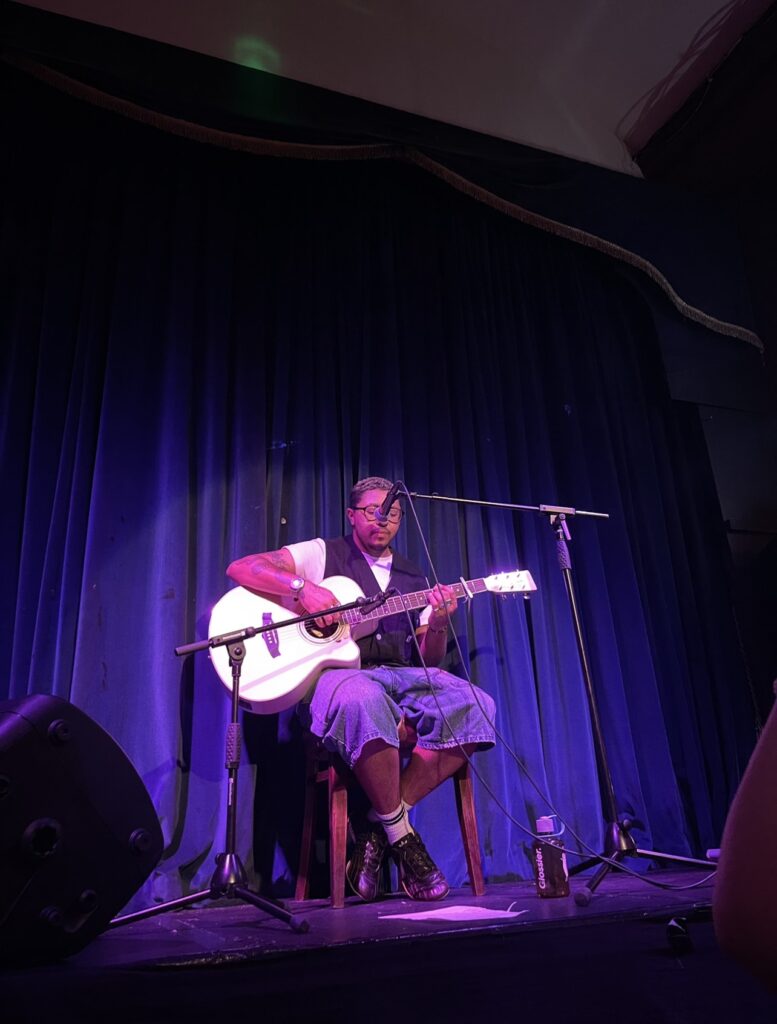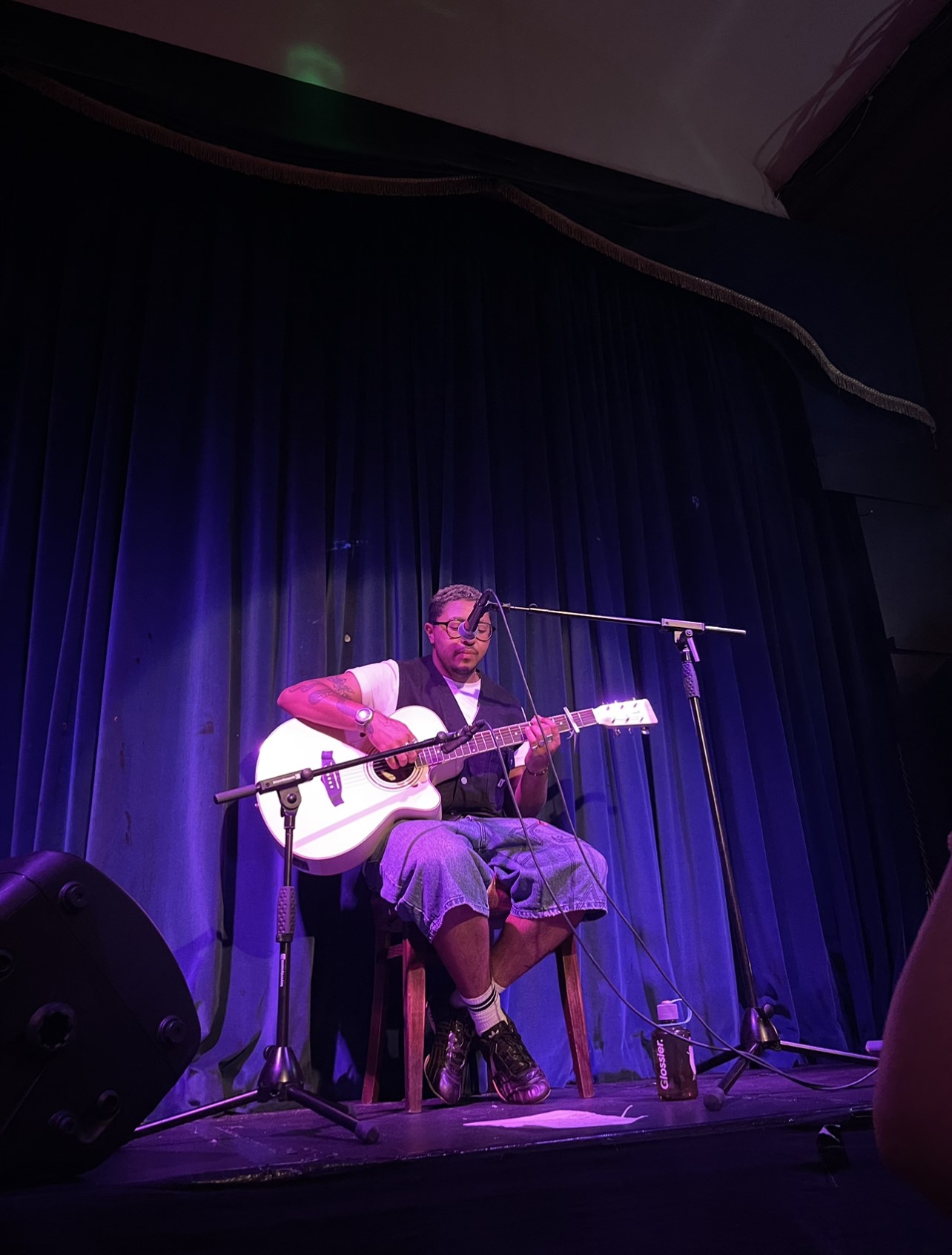Miri FLC (pronouns he/him) is a Brighton born and bred singer-songwriter. He is a good friend of mine and incredibly worthy of all the love and praise I know he receives. When Miri is not on stage, he advocates for LGBTQ+ rights. I had the pleasure of meeting him for coffee last month. We talked about his music and his experiences as a transgender person.
Charlotte: When did you first learn about what being trans meant?
Miri FLC: I grew up watching YouTube creators like Gigi Gorgeous. I was 7 when I learned what being transgender meant. I felt an indescribable connection to trans creators – but I didn’t know why… When I figured out I was trans, everything just clicked.
C: Who supports you the most?
M: I’m lucky enough to have a great support system around me. I have amazing friends and my mum. Some of my trans friends don’t have that. This doesn’t make sense to me – why wouldn’t you want to care for the people you love? It makes me so happy knowing I can be that for other people.
C: Would you say that you have had different social experiences since your transition?
M: Yes! As a man, people just listen to me now. But, when I identified as a lesbian, I was badly bullied.
I’ve loved being able to explore femininity and masculinity. Before my transition, I avoided feminine things. Now I feel confident wearing a skirt in public and it doesn’t threaten my masculinity at all.
Kids grow up in binary boxes. Girls’ stuff is pink, boys’ stuff is blue etc. Cisgender people are intimidated by people who don’t fit in their boxes. When these kids grow up, they become adults who can’t express themselves and are abusive to those who can.
C: The media can be a scary place for the trans community. If a transphobic person of influence sat in my seat, what would you say to them?
M: I’ve thought about this a lot. People mistake me as a cisgender man. I would love to talk to Rishi Sunak or whoever about the trans community. At the end of the conversation, I would tell them I am trans and see how their attitudes towards me change. Because how were they to know? What does a trans person even look like?
Being transphobic is a choice
People with influence have access to the money and tools to educate themselves. Being transphobic is a choice. With online resources and social media being so accessible, I don’t understand why people are so against the trans community.
C: You mentioned that people are surprised to learn you’re trans. How does that make you feel?
M: It’s a double-edged sword. It makes me feel good knowing that I look masculine. But I try when I can to be open about being trans. It is a massive part of who I am, why should my friends miss out on that?!
C: Tell me more about how your music helped your transition.
M: I’ve been on testosterone for two years. Since then, I’ve been struggling to express my emotions – I haven’t cried in almost a year. I’ve talked to older trans men and they have reassured me that this will come back…
…From understanding emotion and being able to cry when I felt sad, to having to navigate not letting my sadness turn into frustration, I now understand what my audiences feel when they cry at my music. I now need my music and my songs to bring out those tears and process my emotions. I’m happy I do that for people and I can now do that for myself.
C: Who are your favourite LGBTQIA+ artists in Brighton?
M: Scarlett Fae is a Brighton-based musician. She’s incredibly talented.
Also, Conor England. He’s a co-founder of Polyglamarous, a queer club night at the Concorde. The Brighton queer community is so grateful for having that safe space.
C: How are you using your music to help vulnerable people in Brighton?
M: As a kid, I used to receive help from Audio Active. It’s a youth group that helps people through music therapy. The people who work there saw music in me and nurtured that. I’m forever grateful. Now, I work as a young music leader! It has been so rewarding.
I’ve performed at and attended fundraising events for trans people… I had a great time at The Actors in Kemptown. It’s a great queer-friendly pub, I loved performing there.
C: Do you have anything else to add?
M: I love being trans. I am proud of it and it’s not something I’m ashamed of.

As usual, listening to Miri talk about his experiences so eloquently and with so much wisdom was a delight. In recent months, transgender people have been thoroughly abashed in the media. I hope this interview with Miri shows that transphobia and homophobia hurts real humans, each with their own story to tell. Brighton has a reputation for being the queer capital of the UK, however there is always more work to be done. We all deserve to feel safe and welcome in this lovely little city. The Badger will always be here to champion this.
Miri is currently fundraising for his top surgery. If you would like to help, search “Help Miri Get Top Surgery” on GoFundMe. Thank you.

